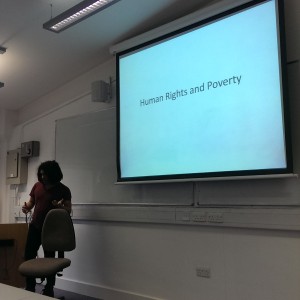During the International Human Rights Law module, we were able to welcome experts from specific subjects in Human Rights (the citizen, the refugee, the cultural subject, the woman…). In our penultimate session, we had the opportunity to attend a lecture by Robert Knox. He is currently a professor in the University of Liverpool and his main interests are in the fields of critical and marxist legal theory and public international law.
The theme for the lecture was ‘the poor’ and he gave an excellent talk about the relationship between poverty, capitalism and human rights. Although we usually think about poverty as a characteristic possessed by certain people, Knox understands poverty as a process or relationship that people are involved in. With this reasoning in mind, he introduced us to the very interesting conceptualisations between poverty and human rights. For this approach, there are three ways to think about this complex relationship: a conservative, a liberal and a radical version.
The conservative version maintains that there is no relationship between poverty and human rights. In this vision, clearly influenced by its historical roots in the opposition to the Soviet Union during the Cold War and the de-colonialist process, human rights are primarily understood as civil and political rights. Therefore, the conservative civil society that supports this vision is completely agnostic about poverty and, in general terms, about social and economic rights.
On the other hand, a liberal approach to poverty accepts human rights can and should be used as a tool to eliminate the negative aspects of globalisation. From their point of view, civil and political rights help to reduce poverty as they allow the poor to participate in the democratic life, empowering themselves to change the policies in their interest. Once more, the change in the vision was influenced by the political context: with the decline of the Soviet Union and the rise of the neoliberalist theory, poverty started to be a much more visible problem that could not be ignored as easily as before.
Finally, the radical version, with which Professor Knox identifies, has a contrasting approach in which human rights and poverty are antagonistic. They are radically opposed as human rights are extricably linked and understood under the notions of the existing order. And, at the same time, the existing order systematically violates them. Explaining it in simple terms: the basics on which modern states are organised (capitalism, globalisation, neoliberalism,…) are contrary to the demands of human rights. Therefore, for the radical perspective, the belief in human rights necessarily means the belief in a different order in which these rights can be fulfilled and respected.

Although they seem very opposed views, these three approaches have in common their idea of how poverty is generated. The two first visions understand poverty as something contingent to the world we live in. Similarly, the radical vision, agrees that poverty is contingent to the world, but challenges this structure and looks for other models where human rights do have a place.
The marxist tradition is logically inside the radical approach and it particularly considers that our very understanding of a ‘right’ is complicit in the production of poverty. Because the law is intrinsically associated with capitalism (it is a mutual necessity), using human rights laws to combate poverty is problematic.
“What matters is not to know the world but to change it” – Fanon, Black Skins, White Masks (1952)
This was a brief explanation of the main concepts discussed in the lecture. Through a very appealing argumentation, Knox introduced us to many diverse areas around poverty that human rights mainstream scholars do not usually approach. This lecture was amongst the top lectures in my LLM courses, as it introduced us to various challenges in the way we understand human rights and law in general. Even if you do not agree with the radical vision, or with any of the three, having different levels of looking at the question of the relationship between poverty and human rights was enriching.
By thinking about these relationships from a less common perspective, we – as LLM students – encountered contrasting answers to the ones we found in the dominant discussion. The relationship between the law and the ‘issue’ (poverty, in this case) differs in its way of production, its value and even its core definition as a result of a more critical approach. And this knowledge is something to apply not only for our final essays, but in our future professional careers.
The students would like to thank professors Robert Knox, Luis Eslava and the rest of the guest lecturers in this module for the terrific experience!
I would like to specially thank my LLM colleague Babikir Osman for his help with the materials for this blog post.
